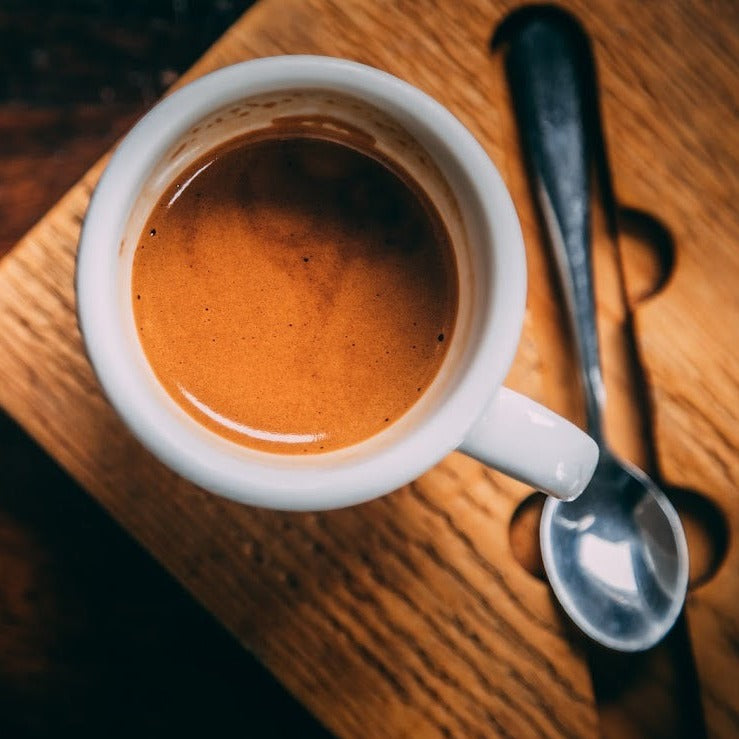Checking Out the Rich Flavors of Coffee Beans: a Deep Study Coffee and Blended Coffee Beans
When you check out the rich flavors of coffee beans, you uncover a complex globe where each selection brings its very own character to your mug. Comprehending the origins, refining approaches, and toasting techniques can transform your coffee experience. As you browse with the art of coffee and the imagination behind blended coffees, you'll start to value the subtleties that make each sip unique. What you'll uncover next may change the means you enjoy your morning mixture.
The Beginnings of Coffee Beans: Discovering Terroir and Taste Profiles
When you take a sip of coffee, you're not just appreciating a drink; you're experiencing a rich tapestry of flavors shaped by the beans' origins. Each region produces distinct flavor accounts affected by altitude, dirt, and climate. As an example, beans from Ethiopia commonly rupture with brilliant, fruity notes, while those from Colombia have a tendency to offer a well balanced, nutty sweetness.
As you explore different beginnings, you'll notice exactly how terroir-- the ecological variables affecting a plant-- plays an important duty - Single Origin Espresso. The same coffee range can taste drastically various depending on where it's grown
When you take into consideration these elements, you start to value the intricacy behind your cup. Each sip narrates of the land and the farmers that nurtured the beans. So, next time you delight, think of the journey your coffee took prior to it reached your hands, and appreciate those intricate flavors that mirror its origin.
Comprehending Espresso: The Art and Scientific Research Behind the Mixture
When you think of espresso, it's not almost the solid taste; it's likewise regarding the methods that bring it to life. Comprehending just how various prep work techniques impact taste can change your developing experience. Let's check out the ins and outs of coffee preparation and uncover the unique taste accounts that make each cup special.
Coffee Prep Work Methods
Espresso preparation is both an art and a scientific research, integrating accurate techniques with a deep understanding of coffee. To begin, you'll want to choose top quality, freshly baked beans and grind them carefully for optimal extraction (Single Origin Espresso). The grind size is essential; as well coarse, and your coffee will certainly be weak, as well great, and it'll be bitter
The outcome ought to be an abundant, velvety coffee with a stunning layer of crema on top. With practice, you'll grasp these strategies.
Flavor Accounts Discussed
The world of espresso uses an abundant tapestry of taste accounts that can boost your coffee experience. Light roasts frequently showcase brilliant level of acidity and vivid flavors, while dark roasts existing deeper, bolder tones.
Recognizing these accounts helps you select the appropriate espresso for your palate. Trying out various blends can disclose shocking combinations. A well-crafted mix may balance the brilliant notes of an Ethiopian bean with the rich, chocolatey undertones of a Brazilian bean. Embrace the journey of finding espresso's diverse flavors, and you'll transform your coffee ritual into an exciting adventure.
Processing Methods: How They Influence Flavor and Scent
While it could seem that the origin of coffee beans is the most significant factor in establishing their taste and aroma, the handling techniques used post-harvest play an equally important role. You'll locate that these techniques can considerably alter the last taste account of your mug.
For example, the washed process gets rid of the fruit from the beans before fermentation, frequently bring about a cleaner, brighter flavor. The natural procedure leaves the fruit intact during drying out, resulting in a sweeter, fruitier profile.
Various other methods, like honey handling, strike a balance, enabling some fruit mucilage to remain, supplying a special complexity.
Each handling technique connects with the beans' fundamental features, improving or silencing specific tastes and aromas. When you drink that espresso or mixed coffee, bear in mind that the journey from cherry to cup is affected not just by beginning but likewise by just how those beans were refined.
Roasting Methods: Opening the Full Possible of Coffee Beans
Roasting methods are necessary for disclosing the full potential of coffee beans, as they transform raw, environment-friendly beans into the aromatic, tasty coffee you take pleasure in. The selection of toasting approach-- light, tool, or dark-- significantly affects taste accounts.
A slower roast at lower temperatures allows for complex tastes to create, while a quicker roast can escalate resentment. By grasping these techniques, you'll disclose a world of taste, raising your coffee experience to new elevations.
The Magic of Blended Coffee: Developing Special Flavor Experiences
Developing an one-of-a-kind taste experience with mixed coffee can change your morning routine into an exploration of preference. By integrating different beans from various areas, you can expose a harmony of tastes that raise your cup to brand-new heights. Each mix deals a distinctive account, balancing level of acidity, sweet taste, and body to develop something absolutely special.
When you choose a mix, you're not just picking a coffee; you're picking a trip throughout diverse landscapes and cultures. Try out various combinations allows you their explanation to discover your personal favorites, whether you take pleasure in fruity notes or rich, chocolatey touches.

Sampling Notes: Acknowledging the Subtleties in Your Cup
As you drink your coffee, you might notice a range of tastes dancing on your taste, each revealing the intricacies of the beans. You might taste the intense acidity evocative citrus or the deep, rich notes similar to dark chocolate. The sweet taste might evoke honey or sugar, stabilizing the overall account beautifully.
Take note of the body of the coffee-- does it really feel light and airy, or is it full and luscious? The finish, also, Recommended Reading supplies hints; a lingering aftertaste may hint at nuttiness or floral touches.

Don't forget to discover the one-of-a-kind features of different origins, as each area passes on distinctive flavors - Single Origin Espresso. As an example, Ethiopian coffees commonly existing fruity notes, while Colombian beans could showcase an extra spherical sweetness. By identifying these nuances, you'll deepen your admiration for each cup, raising your coffee experience to new heights

Brewing Approaches: Making Best Use Of Taste Removal for each Bean
When you discover the various developing techniques, you'll find that each technique can dramatically affect the taste profile of your coffee. From French press to pour-over, each method essences different substances, boosting or silencing particular notes. For circumstances, using a French press permits oils to remain in the brew, developing a richer taste, while pour-over highlights clearness and brightness.
Temperature level and grind size also play essential functions. A coarser work functions best for cool mixtures, while a great work is optimal for coffee. Trying out water temperature level-- in between 195 ° F and 205 ° F-- can expose hidden flavors, as well.
Do not neglect concerning soaking time; a fast extraction can bring about sour notes, while over-extraction may generate resentment. By changing these variables, you can make best use of taste extraction and really elevate your coffee experience. Delight in the journey of finding what technique ideal fits your palate!
Often Asked Questions
What Is the Perfect Water Temperature Level for Brewing Coffee?
The optimal water temperature level for developing coffee's in between 195 ° F and 205 ° F. If you utilize water that's also hot, you'll over-extract flavors; too cool, and you will not extract enough. Go for that wonderful place for the very best brew!
How Does Work Dimension Affect Coffee Flavor?
Grind size significantly influences coffee flavor. Finer grinds remove much more oils and tastes, causing a bolder taste, while coarser grinds return a lighter taste. Changing grind size sites assists you accomplish your desired coffee profile.
Exist Health And Wellness Advantages Associated With Drinking Coffee?

What Is the Difference In Between Arabica and Robusta Beans?
Arabica beans are smoother and sweeter, typically featuring fruity tastes, while robusta beans are stronger with a bitter preference and greater caffeine web content. You'll observe these differences in scent and developing experience.
How Can I Store Coffee Beans for Freshness?
To save coffee beans for freshness, keep them in an airtight container, far from light, dampness, and warmth. If you just grind what you need right before developing., you'll keep their flavor longer.
Checking Out the Rich Flavors of Coffee Beans: a Deep Dive Into Coffee and Blended Coffee Beans.
When you discover the abundant tastes of coffee beans, you reveal a complicated globe where each range brings its own character to your cup.When you take a sip of coffee, you're not just enjoying a drink; you're experiencing a rich tapestry of flavors formed by the beans' beginnings.Roasting strategies are important for exposing the complete potential of coffee beans, as they transform raw, green beans right into the fragrant, savory coffee you take pleasure in.As you sip your coffee, you could notice a range of flavors dancing on your taste buds, each disclosing the details of the beans.
Comments on “Enjoying Food and Desserts with SOE Single Origin Espresso”